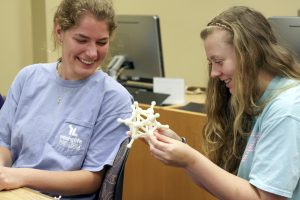
TUSCALOOSA, Ala. — Researchers at The University of Alabama hope to place as many as 15 STEM teachers in area schools through a $1.95 million grant that will provide tuition assistance, enhanced teacher training and robust salary supplements.
UA was recently awarded a Developing Leaders in Science Teaching grant from the National Science Foundation to recruit college graduates from STEM disciplines to pursue master’s degrees and earn secondary teacher certifications at UA.
“When they complete their master’s degrees, they’ll then apply for jobs in school systems, hopefully local school systems,” said Dr. Dennis Sunal, UA professor of secondary science education and principal investigator for the program.
“They’ll also be in an induction program for four years, where they’ll be working with faculty from their home department, teamed up with a teacher from their high school.”
The LIST grant will provide a $17,100 scholarship for tuition and living expenses for the 36-hour master’s program and certification. Participants also will receive an annual $10,500 salary supplement that will be added to their salary from their school district.
The high schools will receive highly trained teachers with master’s level experience, which are harder to come by due to salary demands in science fields.
“The starting salary will be about $55,000, which competes very well with graduates coming out of scientific fields,” Sunal said. “Additionally, the NSF structures the grant with four years of induction to try and sustain it. It’s up to UA researchers to design a good sustaining program where they’ll want to stay in science education.”
Sunal said Tuscaloosa City and County Schools are discussing providing other incentives and amenities, like additional salary supplements and modern labs and equipment, to attract LIST scholars to their schools.
“We’re working to address all of these issues to keep them teaching for the rest of their working careers,” Sunal said. “We want to provide good depth of understanding in how to teach science learning goals. We also want to create teacher leaders, so when they come out after four years, they’ll have a lot of experience of their own to work with other teachers in their school.”
To reach the goal of creating teacher leaders, each LIST scholar will be paired with a teacher in either the Tuscaloosa City or County school systems, a faculty member of UA’s department of curriculum and instruction and a UA professor from their corresponding science field.
The induction group will provide guidance to the scholars, observe and answer questions related to content and pedagogy.
The University team responsible for conducting the six-year grant includes, in addition to Sunal, Drs. Janis O’Donnell, chair, biology department; Ranier Schad, physics and astronomy department; Kevin Shaughnessey, chair, chemistry department; and Cynthia S. Sunal, chair, department of curriculum and instruction.
The LIST grant is the latest in UA’s efforts to attract and produce STEM graduates for K-12 education. UA is partnered with Alabama community colleges for the Robert Noyce Teacher Scholarship Program, a $1.45 million grant from the NSF to attract transfer students and current UA undergraduates into STEM education.
That five-year project began in 2013. UA is also part of the Alliance for Physics Excellence, a NSF program aimed at integrating the latest teaching practices into secondary physics programs via per-service teachers and those already in the field.
Contact
David Miller, UA media relations, 205/348-0825, david.c.miller@ua.edu
Source
Dr. Dennis Sunal, 205/348-7010, dwsunal@ua.edu
